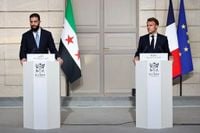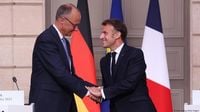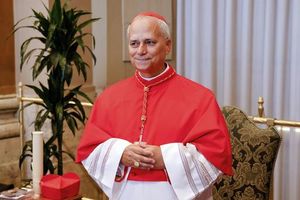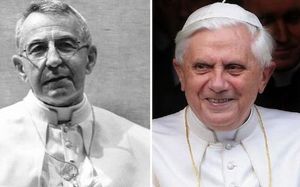Newly appointed German Chancellor Friedrich Merz has expressed a strong commitment to enhancing discussions on nuclear deterrence with European allies, particularly France and Great Britain. During his inaugural foreign visit to Paris on May 7, 2025, Merz emphasized the urgent need for collaboration in ensuring collective security in light of evolving global threats.
Meeting with French President Emmanuel Macron, Merz articulated his vision for a united European front against potential aggressors, specifically citing Russia's growing threat to the continent. "I see a fundamental need to discuss with France and Great Britain how we can jointly ensure such deterrence in the future," Merz stated, highlighting the importance of a cohesive strategy among European nations.
Merz’s remarks come at a critical time as Europe grapples with the ramifications of the ongoing conflict in Ukraine, which Macron has described as a "global conflict." In a televised address earlier in March, Macron underscored the necessity for France to consider expanding its nuclear umbrella to protect its European allies, stating, "France is ready to take allies under its nuclear umbrella." This sentiment reflects a growing recognition of the need for European nations to bolster their defense capabilities in response to external threats.
During their discussions, both leaders acknowledged that while the potential expansion of France’s nuclear capabilities is significant, it will not replace the nuclear guarantees provided by the United States. Instead, Merz clarified that these developments would serve as a supplement to existing U.S. security assurances. This nuanced approach aims to strengthen Europe’s defense posture without undermining transatlantic ties.
In addition to nuclear deterrence, Merz and Macron agreed to enhance cooperation in various defense sectors, recognizing that the challenges facing Europe cannot be met in isolation. "Europe is facing colossal challenges, and we can only respond if France and Germany are even closer than ever before," Merz remarked, underscoring the pivotal role of Franco-German relations in shaping European security policy.
Macron echoed this sentiment, stating that their primary mission is to ensure European security. He emphasized the need to ramp up cooperation and investment in defense, including the development of new weapons systems. To facilitate this, the two leaders announced plans to establish a joint defense and security council, which will convene regularly to address pressing security issues.
This renewed focus on defense collaboration marks a significant shift from the previous administration under Olaf Scholz, where the alliance with Macron lacked the same vigor. Observers note that the Merz administration is keen to reinvigorate Germany’s role in European affairs, particularly in light of recent geopolitical shifts.
Later on the same day, Merz is scheduled to visit Poland, furthering his diplomatic outreach in the region. This trip is seen as a strategic move to demonstrate Germany’s commitment to active diplomacy and to reaffirm its leadership role in Europe following a period of political stagnation.
As the situation in Ukraine continues to evolve, the partnership between France and Germany will be crucial in navigating the complexities of European security. Both nations are recognizing that a united front is essential not only for their own national interests but for the stability of the entire region.
In conclusion, the discussions between Chancellor Merz and President Macron represent a significant step toward a more integrated and collaborative European defense strategy. As they move forward, their commitment to strengthening Franco-German relations will likely play a pivotal role in shaping the future of European security amidst ongoing global challenges.





